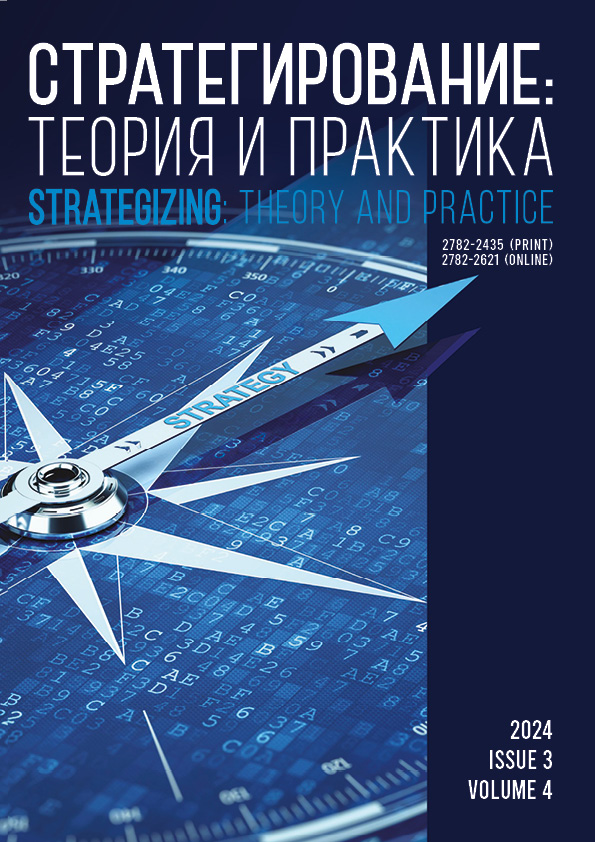Moscow, Moscow, Russian Federation
Universal methodological standards for new innovative clusters are an issue of uttermost importance during the current emergency period. An effective methodology of cluster strategy development is crucial for stimulating innovative growth. This study proves that the methodology developed by Professor Vladimir L. Kvint is able to provide strategic success in developing the innovation clusters system in the current Russian realities. Strategic leaders and strategy developers are recommended to adhere to the fifteen key principles of strategic thinking described in this article.
innovations, innovation clusters, methodology of strategizing, cluster strategizing, strategic thinking rules
1. Astapov KL. Financial market development strategy in crisis: analysis and recommendations. Economic Analysis: Theory and Practice. 2021;(11):2021–2052. (In Russ.) https://doi.org/10.24891/ea.20.11.2021
2. Astapov KL, Liu Yu. Implementation of platforms’ strategy by financial companies in China and Russia. Administrative Consulting. 2020;(8):112–122. https://doi.org/10.22394/1726-1139-2020-8-112-122
3. Belyaev DA, Volkova OA, Shebolkina EP. Potential of cognitive management and value-communicative nature of university education. Vysshee obrazovanie v Rossii = Higher Education in Russia. 2019;28(2):105–116. (In Russ.) https://doi.org/10.31992/0869-3617-2019-28-2-105-116
4. Blaug M. Metodologiya ekonomicheskoy nauki, ili Kak ekonomisty obyasnyayut [Methodology of economic science, or How economists explain]. Moscow: Voprosy Ekonomiki; 2004. 415 p. (In Russ.)
5. Borisova TS, Sartakova EE. The living space of modern Russian youth: challenges, problems, opportunities. Tomsk State Pedagogical University Bulletin. 2018;8(197):224–230. (In Russ.) https://doi.org/10.23951/1609-624X-2018-8-224-230
6. Brealey R, Myers S. Principles of corporate finance. Moscow: Olymp-Business; 2015. 1120 p. (In Russ.)
7. Van Horne D, Wachowicz JM. Fundamentals financial management. 12th ed.; transl. from Eng. Moscow: ID Williams; 2008. 1232 p. (In Russ.)
8. Varetsa RA. The role of technological entrepreneurship in industry in modern conditions. Izvestiya of Saratov University. Economics. Management. Law. 2024;24(2):138–146. (In Russ.). https://doi.org/10.18500/1994-2540-2024-24-2-138-146
9. Dobrynina MV, Rastimeshina TV. University as a driver of new industrial policy of Russia: efficiency evaluation (using the case of national research university of electronic technology). Science and Technique. 2024;23(1):67–79. (In Russ.) https://doi.org/10.21122/2227-1031-2024-23-1-67-79
10. Castells M. The information age: economy, society and culture. Moscow: SU HSE; 2000. 606 p. (In Russ.)
11. Kvint VL. The Concept of Strategizing. Vol. 1. St. Petersburg: NWIM RANEPA, 2019. 132 p. (In Russ.)
12. Kvint VL. The Concept of Strategizing. Vol. 2. St. Petersburg: NWIM RANEPA, 2020. 164 p. (In Russ.)
13. Kvint VL Strategic Leadership of Amir Timur: Comments on the Code. VL Kvint (foreword, commentary). Saint Petersburg: IPC SZIU RANEPA; 2021. 204 p. (In Russ.)
14. Kvint VL. The global emerging market: strategic management and economics. Moscow: Biznes atlas; 2012. 627 p. (In Russ.)
15. Kiryakova AV, Kargapoltseva NA, Belonovskaya ID. Scientific and pedagogical projections of the transformation of university education. Vysshee obrazovanie v Rossii = Higher Education in Russia. 2020;29(8–9):155–167. (In Russ.) https://doi.org/10.31992/0869-3617-2020-29-8-9-155-167
16. Kozhanova VP, Fomina SN. The importance of youth scientific communities in the professional self-determination of students in schools and university students. Scientific Notes of Russian State Social University. 2018;17(4)(149)):100–107. (In Russ.) https://doi.org/10.17922/2071- 5323-2018-17-4-100-107
17. Kvint VL, Alimuradov MK, Zadorozhnaya GV, Astapov KL, Alabina TA, Bakhtizin AR, et al. A conceptual future for the Kuzbass region: strategic outlines of developmental priorities through 2071, a 50-year perspective. Kemerovo: Kemerovo State University; 2022. 283 p. (In Russ.) https://doi.org/10.21603/978-5-8353-2812-3
18. Nesterova OA. Directions for improvement of the innovative educational system providing comprehensive development of innovative persons. Journal of Altai Academy of Economics and Law. 2022.1;1-3:483–488. (In Russ.) https://doi.org/10.17513/vaael.2594
19. Novikova IV. The concept of employment strategy for the digital economy. Kemerovo: Kemerovo State University; 2020. 254 p. (In Russ.) https://doi.org/10.21603/978-5-8353-2609-9
20. Stefanov OV. IT Cluster as a Driver for the Growth of the Region’s Innovative Potential. Progressive Economy. 2024;6:7–16. (In Russ.) https://doi.org/10.54861/27131211_2024_6_7
21. Chkhotua IZ, Khvorostyanaya AS, Sadovnichaya AV, Pyatovsky AA, Yumatov KV, Shevchuk AV, et al. Strategizing of the tourism and trade show industries in Kuzbass region. Kemerovo: Kemerovo State University; 2021. 371 p. (In Russ.) https://doi. org/10.21603/978-5-8353-2718-8
22. Kvint VL, Alimuradov MK, Astapov KL, Alekseev GF, Bagaev DV, Boksgorn AA, et al. Strategizing of Kuzbass region economic and investing development. Kemerovo: Kemerovo State University; 2021. 364 p. (In Russ.) https://doi.org/10.21603/978-5-8353-2724-9
23. Kiryakova AV, Kargapoltseva NA, Belonovskaya ID, Duzhnikov SA. University as an environment of innovative interactions. Vysshee obrazovanie v Rossii = Higher Education in Russia. 2021;30:8-9:115–124. (In Russ.) https://doi.org/10.31992/0869-3617-2021-30-8-9-115-124
24. Khvorostyanaya AS. Strategizing Singapore’s creative economy: experience in workforce development. Economics of Sustainable Development. 2023;54(2):136–140. (In Russ.)
25. Khvorostyanaya AS. Strategizing of the creative economy youth innovation ecosystem national brands (South Korean experience). Administrative Consulting. 2023;171(3):46–56. (In Russ.) https://doi.org/https://doi.org/10.22394/1726-1139-2023-3-46-56
26. Kvint V. The global emerging market: Strategic management and economics. New York: Routledge; 2009. 488 p. https://doi.org/10.4324/9780203882917





